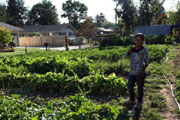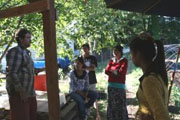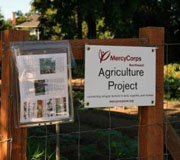VOA标准英语2011--Farming Helps Refugees Put Down Roots
时间:2019-02-12 作者:英语课 分类:VOA标准英语2011年(十一月)
Farming Helps Refugees Put Down Roots
For refugees, starting over in a new country can feel like landing on a new planet. It’s difficult enough to understand daily life, much less face the challenges of finding a job.
In America’s Pacific Northwest, a program to ease the refugee resettlement experience is helping 1 people put down new roots, literally 2, through agriculture.
But learning to be an American farmer can be a tough row to hoe.
A few years ago, a small plot in southeast Portland, Oregon, was an empty lot. Now, it’s a densely-planted farm. Tomatoes are ripening 4 on the vines and the lemon cucumbers are nice and juicy.
Learning curve
David Beller, the farm’s coordinator 5, is not happy with the fields. “Everyone come here, and feel how dry this is. I can’t believe this stuff is even alive.”
The farmers Beller is working with are refugees from Bhutan, a small, landlocked country in the Himalayan highlands, on China’s southern border.
Their translator says, "Oh, they thought that they doesn’t have to put water in.”

Farmer Pabi Tiwari, who moved to Oregon from a Nepalese refugee camp, enjoys a lemon cucumber fresh from the fields.
The refugees-turned-farmers arrived in Portland a couple of years ago and are now part of the New American Agriculture Program at MercyCorps Northwest. The group is known for its international development work, but a local division helps people in Washington state and Oregon.
“We started working with refugees, engaging them in urban agriculture in 2004, with the motivation that food is a connector, and there was growing interest in local food," says John Haines, who directs the local program. "And the refugees were coming with motivation, some skills in growing.”
Putting down roots
The idea of small urban plots, where people can earn supplemental income close to their homes, is now a part of refugee resettlement programs all over the country. There are Somali Bantus farming in Boise, Idaho, and refugees from Burundi growing crops in Seattle, Washington.

Farm program manager David Beller talks to refugee farmers Pabi Tiwari, Guman Bharati, Jumuna Bharati and Pabitra Tiwari.
When Bal Tiwari moved to Portland from a Nepalese refugee camp, he was excited to have the opportunity to farm again. In fact, he was just glad to discover that America had farms.
“He said that he never thought that he’ll get an opportunity to work in the farm," says the translator who is interpreting for Tiwari. "Because they said that America doesn’t have any kind of agriculture production, and he thought he’ll get all the things from out of country.”
Becoming an American farmer is a big adjustment for refugees. First, they speak very little English, and often have little formal education, which limits their ability to use most training materials. They also have to adapt to a different climate. Back in their home countries, many refugees practiced a casual subsistence agriculture, cultivating fruits and vegetables for their families. Here, they produce a marketable crop on dense 3, urban plots.
“For example, these farmers are really into planting beans spaced out farther than I like," farm manager David Beller says. "And they’re convinced that it’s the best way to grow beans, and they’re easier to pick and better quality. And I’m convinced of exactly the opposite. So there’s a healthy tension between different practices.”
Going to market

Up until a few years ago, this MercyCorps Northwest farm plot in southeast Portland, Oregon, was a vacant lot.
The learning process doesn’t end at the harvest. MercyCorps staff also teach farmers how to grade their crops for the American market and how to pack it so that it won’t bruise 6. The hard work is paying off.
The Portland plots now produce enough vegetables to sell to local farmers’ markets, a few restaurants and members of their Community-Supported Agriculture program. And the benefits go beyond the economic.
“They get some connectivity to the wider community. They’re comfortable getting on a bus going across town, they get comfortable with selling at a market," director John Haines says. "So we find it’s a way to bridge isolation 7 as much as provide a modest income.”
And, of course, there are also the edible 8 benefits, as a translator relays for Pabi Tiwari. "They are getting the fresh vegetables and the fresh fruits. They don’t have to pay in market. It’s kind of free food and fresh food.”
Although, as Nisha Basnet laments 9, it’s not quite as good as back home. "We have a very sour tomato in Nepal, and here it is kind of sweet or something. It doesn't taste good like Nepal.”
The Nepalese farmers hope that they’ll someday be able to get seeds for their native tomatoes and beans, and grow them right here in the Northwest.
- The poor children regularly pony up for a second helping of my hamburger. 那些可怜的孩子们总是要求我把我的汉堡包再给他们一份。
- By doing this, they may at times be helping to restore competition. 这样一来, 他在某些时候,有助于竞争的加强。
- He translated the passage literally.他逐字逐句地翻译这段文字。
- Sometimes she would not sit down till she was literally faint.有时候,她不走到真正要昏厥了,决不肯坐下来。
- The general ambushed his troops in the dense woods. 将军把部队埋伏在浓密的树林里。
- The path was completely covered by the dense foliage. 小路被树叶厚厚地盖了一层。
- The corn is blossoming [ripening]. 玉米正在开花[成熟]。 来自《现代汉英综合大词典》
- When the summer crop is ripening, the autumn crop has to be sowed. 夏季作物成熟时,就得播种秋季作物。 来自《简明英汉词典》
- The UN Office for the Coordination of Humanitarian Affairs, headed by the Emergency Relief Coordinator, coordinates all UN emergency relief. 联合国人道主义事务协调厅在紧急救济协调员领导下,负责协调联合国的所有紧急救济工作。
- How am I supposed to find the client-relations coordinator? 我怎么才能找到客户关系协调员的办公室?
- The bruise was caused by a kick.这伤痕是脚踢的。
- Jack fell down yesterday and got a big bruise on his face.杰克昨天摔了一跤,脸上摔出老大一块淤斑。
- The millionaire lived in complete isolation from the outside world.这位富翁过着与世隔绝的生活。
- He retired and lived in relative isolation.他退休后,生活比较孤寂。
- Edible wild herbs kept us from dying of starvation.我们靠着野菜才没被饿死。
- This kind of mushroom is edible,but that kind is not.这种蘑菇吃得,那种吃不得。